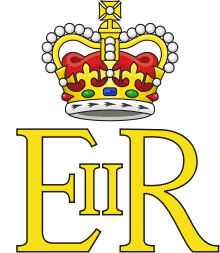Annus horribilis
Annus horribilis is a Latin phrase, meaning "horrible year". It is complementary to annus mirabilis, which means "wonderful year"; however, annus mirabilis is a traditional term, while annus horribilis is of relatively recent coinage.
Elizabeth II
Although the phrase was used in 1891 to describe 1870, the year in which the Roman Catholic church defined the dogma of papal infallibility,[1] it was brought to prominence by Queen Elizabeth II in a speech to the Guildhall on 24 November 1992, marking the 40th anniversary of her accession, in which she described the year as an annus horribilis.[2]
1992 is not a year on which I shall look back with undiluted pleasure. In the words of one of my more sympathetic correspondents, it has turned out to be an Annus Horribilis.
The "sympathetic correspondent" was later revealed to be her former assistant private secretary, Sir Edward Ford. The unpleasant events happened to the Royal Family in this year include:
- On 12 March 1992, Mauritius, the last Commonwealth realm in Africa, abolished its Monarchy.
- On 19 March, it was announced that Prince Andrew, Duke of York would separate from his wife Sarah, Duchess of York.
- On 23 April, Anne, Princess Royal divorced her husband Captain Mark Phillips.
- On 8 June, Diana, Princess of Wales’s tell-all book Diana, Her True Story was published after being serialised in The Sunday Times. Written by Andrew Morton, it revealed for the first time the unhappy truths of the Princess's marriage – particularly, the affair between Charles, Prince of Wales and Camilla Parker-Bowles – starting the "War of the Waleses".
- On 20 August, scandalous pictures of the Duchess of York being kissed on her feet by her friend, John Bryan, were published in Daily Mirror.
- On 24 August, intimate conversations between the Princess of Wales and James Gilbey from a tape recording of their phone calls were published in The Sun, causing "Squidgygate".
- On 13 November, the affair between the Prince of Wales and Camilla Parker-Bowles was confirmed by a transcript of a recording of their phone calls published in the Daily Mirror, causing "Camillagate".
- On 20 November, just four days before the Guildhall speech, Windsor Castle – one of the main royal residences – caught fire and was seriously damaged. Huge public outcry was aroused against the prospect that the cost of repairs might be on government expenses.
- On 26 November, after lengthy discussions and under enormous public pressure, it was announced that the Queen would start to pay income tax and capital gains tax in 1993. This became the first time for a British monarch to pay income tax since 1931.
- On 9 December, John Major, then Prime Minister of the United Kingdom, announced to the House of Commons that the Prince and Princess of Wales had decided to separate.
Kofi Annan
Kofi Annan, then United Nations Secretary-General, used the phrase in his year-end press conference on 21 December 2004. He reflected, "There’s no doubt that this has been a particularly difficult year, and I am relieved that this annus horribilis is coming to an end."[3] His remarks were widely interpreted as having alluded to persistent allegations of corruption in the UN’s Iraq Oil-for-Food Program.[4] His remarks came just days before the deadliest event of the year, the Indian Ocean tsunami on December 26.
Juan Carlos I of Spain
In 2007, the Spanish Royal Family, in particular Juan Carlos I, faced a difficult year. Family tragedy and a series of controversies led to Spanish newspapers to refer to the year as the king’s annus horribilis.[5]
- In February, Érika Ortiz Rocasolano, the youngest sister of the Princess of Asturias, died of a drug overdose in her apartment.
- In July, a humour magazine, El Jueves, published a drawing that ran on the cover, depicting the Prince and Princess of Asturias having sex, with a caption reading: "Just imagine if you end up pregnant. This will be the closest thing to work I’ve ever done in my life." It satirized a proposal by the government to give 2,500 euros to the parents of newborn children. The magazine was banned and removed from distribution, which led to a censorship controversy.
- In September, Catalan separatists were tried for having burned photographs of King Juan Carlos and Queen Sofía at an anti-monarchy and Catalan separatist rally in Girona while the royal couple toured the city.
- In early November at the XVII Ibero-American Summit, after a verbal altercation between Hugo Chávez, President of Venezuela, and José Luis Rodríguez Zapatero, Prime Minister of Spain, the king asked Chávez, "¿Por qué no te callas?" ("Why don’t you shut up?").
- Shortly after the summit, the royal house announced the separation of the king’s daughter, the Duchess of Lugo, and her husband, Jaime de Marichalar. The couple have two children, Felipe and Victoria.
See also
References
- ↑ "Möhler, Döllinger and Oxford Anglicanism". London Quarterly and Holborn Review 75. E.C. Barton. 1891. p. 105.
- ↑ "Annus horribilis speech, 24 November 1992". The Official Website of the British Monarchy.
- ↑ New York, 21 December 2004 - Secretary-General's year-end press conference (unofficial transcript) The Secretary-General Off the Cuff
- ↑ Associated Press (December 22, 2004). "UN chief welcomes end of 'horrible' year". NineMSN. Archived from the original on September 13, 2005.
- ↑ El "annus horribilis" del Rey Juan Carlos, La Nación, 15 November 2007.
External links
| Look up annus horribilis in Wiktionary, the free dictionary. |
- Royal.gov.uk - Transcript of The Queen's speech at Guildhall 24 November 1992
- Annus Horribilis: book by Sam Jordison
| ||||||||||||||||||||||||||||||||||||||||||||||||||||||||||||||||||||||||||||||||||||||
